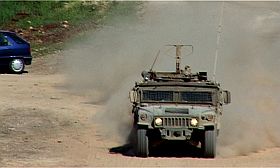


Leaving Israel – a Personal Documentation

It was a nuisance to leave Israel as I did this monday morning. It made me sad and angry. Upon arrival on a sunday night a week ago I went straight through the Ben Gurion airport in Tel Aviv, got my passport stamp, was picked up and arrived quickly at the Cinema Hotel (see below). Easy. I had a wonderful time in both Tel Aviv and Ramallah. Meeting interesting documentary people and projects.
This morning it was a different story. I left from Ramallah, Palestine. I got picked up at the Red Crescent Hotel at 11am, my flight was at 3pm, should be enough time. The taxi driver from Jerusalem, Arabic origin, chose not to pass through the Kalandia checkpoint, too complicated, too much waiting time, he said, so we took a different itinerary with a view to Israeli settlements and Arab villages. We took a bad road classified as an A road, exclusively for Palestinians, to be followed by a good C road, for everybody, an Israeli built road. The taxi driver told me his story – he lives in Jerusalem and works from there, although he has a house in Ramallah. If he lives in Ramallah permanently, has his address there, he will lose his ID and working permit in Jerusalem. They do everything to make life difficult for us, he said, while we were passing a village where muslims and christians live together without problems, he said. He was right about the difficult-statement. When getting closer to the airport, he asked me whether I wanted to say that we come from Jerusalem or whether I would say Ramallah, the truth, which probably would mean more checking and waiting time at the security point outside the airport. I chose the truth, which meant 30 minutes of check of me and the driver. That
means check of the driver, the car and my passport. The driver had to go to a separate room to half-undress and get checked, I waited outside watching the young guys with machine guns. They are not soldiers, they work for a private security service company. Some of them has watched too many American action films, in attitude and way of talking to people!
My turn for verbal check, contrary to his body check, came later. Two hours of waiting in the airport. Loooong lines, questions about what I was doing in Ramallah and Tel Aviv, who hired me, if I had any presents. I said I had received some dvd’s for my work, I got a green label on my luggage for further check later on. Made by a young girl who talked to me as if I was a criminal. Around 10 people going to Vienna, including me with a transit in the Austrian airport, were taken to another floor as it was getting close to boarding the plane, even if I was there 3 hours before departure!
Yes, I do understand the need for checking for explosives in Israel, of course and I have no sympathy for bombs killing people in Jerusalem, like happened when I was there, but I do not understand why the security people have to be inpolite youngsters, who see this job like were they characters in a bad American B-movie – arrogant, wanting to be tough in approach and look. And why does the airport not have more personnel and equipment for the checking procedure? To avoid the long queues? My small insignificant story, however, is nothing compared to the daily humiliation of my taxi driver and the Palestinian people on the West Bank. I repeat the conclusion from last year’s reporting: this is Apartheid! No other word can cover the situation.
Photo from leading Israeli documentarian Avi Mograbi’s “Detail” (2004).